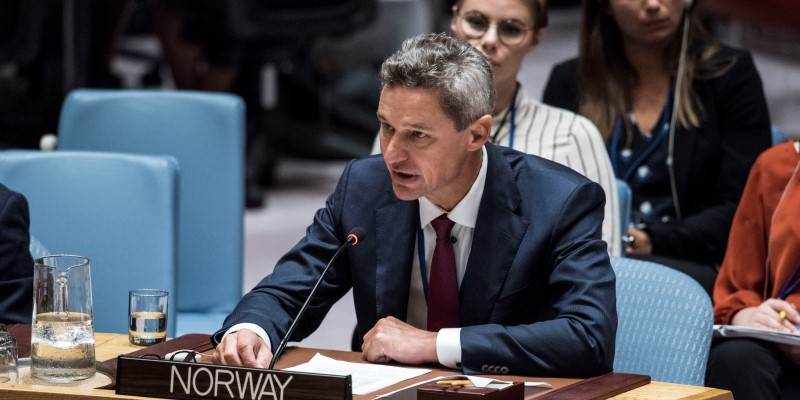Mr President,
I have the honour to speak on behalf of the five Nordic countries: Denmark, Finland, Iceland, Sweden, and my own country, Norway.
It is a particular honour for me to address this Chamber today, as one of my first official actions as Norway’s Ambassador to the UN. I look forward to getting to know you all in the coming weeks and months.
The Nordic countries would like to commend Egypt for initiating this debate, which leads up to the High-level Open Debate on Peace Operations, to be held during Ethiopia’s Presidency next month.
The concept of sustaining peace marks a paradigm shift in our approach to prevention, conflict resolution, peacekeeping and peacebuilding. It requires more holistic strategies – drawing seamlessly on all the tools at the UN’s disposal – along the continuum between conflict and peace.
It is consistent with the reviews conducted over the last few years, and is at the core of Secretary-General’s vision for reform of the UN – a vision to which the Nordic countries fully subscribe.
Mr President,
I would like to focus on three areas in particular where the Nordic countries believe the Security Council can contribute to sustainable peace:
First,
We believe that the Security Council should include a long-term perspective in its mission mandates. Mandates should be based on a joint UN analysis, which considers the root causes of a conflict in order to lay the foundations for lasting peace.
In our view, the recent mandates for the transitions of the UN missions in Liberia and Haiti provide interesting lessons that may inspire other mandate processes.
In Liberia, the mandate tasked the Secretariat to develop a peacebuilding plan in close coordination with the Government and the UN Country Team. It specifically emphasised the Peacebuilding Commission’s important convening role in developing this plan, a role which the PBC’s Liberia configuration has played and will continue to play.
In Haiti, the Council has decided to establish a follow-on peacekeeping mission – MINUJUSTH – to ease the transition as MINUSTAH winds down, enabling Haiti to consolidate the gains it has made towards sustainable peace.
These two examples offer different lessons that could be included in a catalogue of best practices for transitions.
We propose that Member States and the Secretariat develop a catalogue of this kind, which could guide the Secretariat in drawing up future reports to the Council, and form the basis for well-informed mandate discussions in the future.
Second,
UN peace operations should be made more people-centered and inclusive, and should engage more actively with local communities.
This was one of the key recommendations of the High-level Independent Panel on Peace Operations.
In our view, more attention should be paid to this aspect when mandating and designing peace operations.
Missions should be enabled to engage more actively with local governments and communities, including women and young people.
The participation of women must be ensured at all levels.
A more people-centered approach requires close coordination with UN Country Teams in order to avoid duplication and maximise results on the ground.
Third,
Ensuring predictable and sustained financing for peacebuilding is crucial.
Peacebuilding should not be dependent on voluntary contributions alone.
When large missions wind down and withdraw, a large amount of funding and a considerable source of revenues and economic activity are lost.
This may result in severe economic challenges for the country concerned, which in turn could undermine the transition process.
Close consultation between the Council and the PBC is needed in order to reduce the negative economic consequences of transitions.
We look forward to the Secretary-General’s forthcoming report on sustaining peace, which we hope will include guidance on how revenue gaps of this kind can be prevented and bridged in the future.
Thank you.
